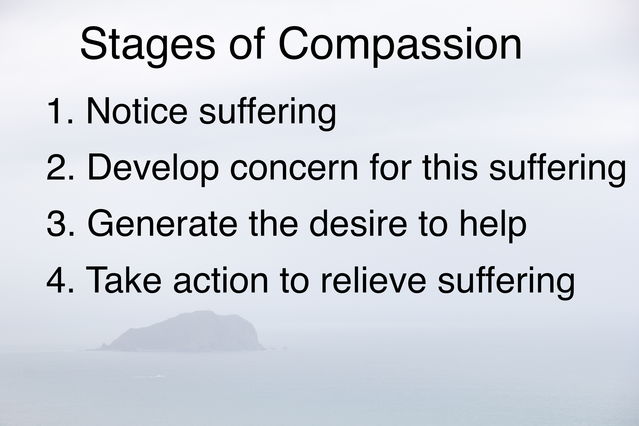President Donald Trump
Compassion for Trump?
What would the stages of compassion for Trump look like?
Posted February 6, 2017

Update 2/19/17: I was interviewed by the BBC's Sunday Sequence about this article.
“Compassion for Trump” seems like the title of a humor article, something by The New Yorker’s Andy Borowitz. “Compassion for Trump–Doctors Announces Transplant Plans!” Compassion for the man whose great belch of ire and self-aggrandizement has been expressed in Executive Orders banning refugees and threatening health care for millions? Compassion for the man who put minorities and other marginalized communities on notice from day one of his campaign, and indeed from the very beginning of his attempts to delegitimize President Obama with his “Birther” claims? A man who gets worked up about the size of his inaugural crowd, to the point of issuing “alternative facts” through his spokespeople? Compassion for a man who doesn’t seem to have much compassion himself? Shouldn’t we reserve our compassion for the vulnerable amongst us, and not the source of their oppression?
This is a hard one, even for seasoned Buddhist practitioners like myself whose values and meditations center on generating compassion for all sentient beings, even our “enemies” or difficult people. President Trump, we may reluctantly admit, is indeed a sentient being—so it’s hard to squirm free of our consciences, despite all the damage he is doing to our highest American principles. Lady Liberty seemed to drop her torch in Trump’s first week in office, and certainly shed a tear, as did many of us.
The first step of compassion is noticing suffering. How could the most powerful man on the planet be suffering? From a Buddhist perspective, we are all suffering, until we are free from greed, hatred and self-centeredness. But as I reflect on President Trump’s actions and words, I am struck by his defensiveness. He seems afraid, insecure, and desperate to maintain a grandiose view of himself; to “win” at all costs. He scapegoats the media and any critic, from Meryl Streep to the former Director of the CIA, all for little gain except to his ego. Certainly, he is also tapping into and articulating the fears and insecurities of millions of Americans about immigrants, Muslims, jobs and governmental overreach. Whether these fears or the responses to them are rational or not is beside the point—the fears exist. “Extreme vetting” seems to be code for his own “extreme vulnerability.”
Fearful...Insecure...Desperate…
Just like me.
Just like me.
We all have felt these emotions, briefly or in long stretches. We can recognize how difficult they are to deal with. How strained we are in their grip! How hard to think clearly and carefully when struck by them. Insecurity and fear are very isolating experiences. Indeed, they spring from and reinforce the kind of self-centeredness and feeling of separateness that are at the center of the suffering about which the Buddha spoke. They can lead us to feel that wealth, power and fame are the only ways to feel safe, secure, and “on top."
So a first step for feeling compassion for President Trump and his supporters is to notice the emotions of fear, insecurity and desperation underneath their words and actions. These emotions are symptoms of their suffering.
The next step on the path of compassion is our own emotional response to the suffering we see. When we truly connect to their emotional state, we recognize ourselves. Vulnerability is at the core of our common humanity. We feel concern for the suffering individuals. We also feel concern for how their suffering affects them and others. Only an experience of belonging and connection can dissolve this suffering, for all of us.
As we deepen our emotional response to suffering, a natural desire to assist the sufferer arises. This is the third step of compassion. If they were free of suffering, they would be more at ease, and less likely to cause harm to themselves or others. We fortify our intentions to help all beings become free from suffering. This strengthens our values, and our sense of ourselves as whole human beings.
Compassion finally moves us to action to assist individuals caught by suffering. Many activists are already doing this for the victims of the President’s policies. I suggest that finding ways to extend compassion and compassionate interaction with Trump and his supporters is also essential, and necessary to resolve our intrapsychic and interpersonal conflicts. No matter what we may think of Donald Trump, he has the hardest job and greatest responsibility in the world right now. If he had greater inner peace, perhaps he could generate peace instead of conflict with his words and deeds. If we all had a true experience of belonging and being cared for, perhaps it would change the adversarial dance in which we find ourselves.
What forms might our compassionate action take? It might be mindfully observing the emotions of those in distress and who distress us, becoming mindful partners to people in the grip of difficult emotions. “You seem afraid. You seem insecure about your popularity, prestige, safety, and strength. I might feel the same, if I were in your shoes, and if I believed as you do.” Or “your fear of certain people seems to be overwhelming. Can we help you ease your fear in less destructive ways?” Or “your tweets often seem impulsive, disproportionate and even cruel. Can we talk about what’s going on inside when you react this way?”
Compassion for Trump would not mean giving him or his administration a bye or pass for their actions or words. It does not mean becoming a doormat in the face of abuse. Far from it. Feeling compassion for them might instead turn us towards more fruitful interactions. Certainly, cultivating compassion is good for our own spiritual growth. It helps us unhook from negative energy; we’re no longer the tail of the dog. Compassion defuses the power of an oppressor to harm us emotionally. And perhaps if he experiences the generosity and inclusion of our vision, he too could transform.
It may seem like a pipe dream. But the alternative, excluding others from our care and concern, shrinks us and creates a split, within us and between us. Limiting the expansive reach of the heart takes us away from our highest possibilities. When we hate, we become enemies of our own love. As the Buddha said, hatred never ceases by hate; by love alone does hatred cease. Christ echoed this by imploring us to love our enemies. Every religion has some version of the golden rule: do unto others as one would have them do unto you.
Difficult people, including President Trump, live rent-free in our minds. The question before us is: “how do we deal with our tenants?” When we cultivate compassion, we are treating ourselves, our own difficult emotions, as much as we are developing concern for the well-being of others, including our so-called “enemies."
Every eight years, we take turns feeling powerful or powerless. Out of powerlessness springs emotions such as dread, despair, hopelessness, defeat, anger and hostility. Most of us now feeling powerless wish to see a world of greater compassion, wisdom and inclusion. Empowering ourselves with compassion is an antidote to powerlessness, and perhaps can lead us towards a transcendence of the polarized duality of “us” and “them” which fuels our collective suffering. When we cultivate compassion, we are healing ourselves and the world.
Ravi Chandra is a psychiatrist and writer in San Francisco. This does not constitute a professional opinion, but is based on my experience as a Buddhist practitioner. Moreover, I recognize we may all come to different conclusions and be in different places on these issues. In this essay, I’ve condensed perhaps six months of meditation into 1200 words. I wish you well on your journey.
(c) 2017, Ravi Chandra, M.D. F.A.P.A.
Occasional Newsletter to find out about my books-in-progress on the psychology of social networks (Facebuddha) and insecurity and vulnerability (The iBomb) www.RaviChandraMD.com
Private Practice: www.sfpsychiatry.com
Twitter: @going2peace
Facebook: Sangha Francisco-The Pacific Heart
For info on books and books in progress, see here and www.RaviChandraMD.com

References
Jinpa, Thupten. A Fearless Heart: How the Courage to Be Compassionate Can Transform Our Lives. Avery, 2016




